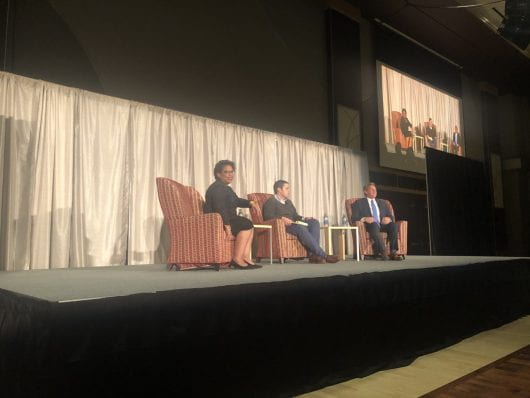
Former Attorney General Loretta Lynch (left) and former Sen. Jeff Flake (right) discussed President Trump, the future of the Republican Party, bipartisanship in politics and other topics during “OUABoth Sides of the Aisle” Nov. 4. Credit: Trevor Simpson | Lantern Reporter
Bipartisanship, the integrity of United States elections and the Oval Office were discussed in the Ohio Union Activities Board’s “OUABoth Sides of the Aisle” event Monday.
Former Arizona Republican Sen. Jeff Flake and former Attorney General Loretta Lynch represented the right and left, respectively, as panelists during the discussion at the Ohio Union. Among the topics covered were the current political moment, whether Americans truly want bipartisanship and the ongoing impeachment inquiry into President Donald Trump.
Flake was a member of Congress from 2001 to 2019, serving as a U.S. representative until his election as a senator in 2013. Flake did not to run for re-election in 2018.
Lynch was appointed Attorney General by former President Barack Obama in April 2015. She served in the position until Trump’s inauguration in January 2017.
Thomas Wood, an assistant professor in political science, moderated the event. Wood’s research focuses on campaign effects, using new data and identification methods to understand how campaigns can influence voters’ attitudes, preferences and behaviors, according to his Ohio State bio.
Trump was a recurring theme of the event, whether in reference to the integrity of U.S. elections, the longevity of his ideologies and principles after his administration or the impeachment inquiry.
The only applause of the night came when Lynch was asked whether she thought Trump’s moment in power was going to be short-lived or not.
“I think we spend too much time focusing on Trump and his tips, his twitches, his tweets and too little time focusing on why there was 60 million people thinking that’s what our president should look like,” Lynch said.
Despite Flake’s Republican background, he has been a vocal critic of Trump since his campaign in 2016 and continued to voice his disapproval Monday night.
“I don’t like the president,” Flake said. “I hope in a couple of years, we’re not just rid of Trump, but we’re rid of Trumpism.”
He defined Trumpism as the act of attacking political opponents between elections, not during.
Ricky Madrid, a fourth-year in political science and economics and president of the Alexander Hamilton Society at Ohio State — an independent, nonpartisan student organization dedicated to promoting constructive debate, according to the club’s constitution — attended the event and said he took note of the ovation, inferring that those of differing political ideologies in the crowd had their own rationale for the gesture.
“So many people clapped, but everyone clapped for a different reason,” Madrid said. “Everyone agrees that there’s something there, but not in the same way.”
U.S. House Speaker Nancy Pelosi launched an impeachment inquiry into Trump in September on the grounds that he withheld foreign aid to Ukraine in exchange for information on Democratic presidential candidate Joe Biden.
Lynch said there is serious concern surrounding Trump’s actions based on the current reports and called the impeachment process “as important a process as anything.”
Flake said he believes the most likely outcome is impeachment in the House of Representatives without conviction in the Senate. He said he’s concerned a failed impeachment attempt would embolden Trump’s base in the future.
“My preference is — now that we are within one year of re-election or election — is that we can let elections take care of it,” Flake said.
Madrid said he was surprised OUAB was able to secure the two panelists, calling them “great choices” to facilitate an interesting conversation on collaborating with members on different sides of the political spectrum.
He said it’s important to discuss these topics because there are real-world applications when it comes to respecting each side.
“This is necessary because if we need to make decisions, and neither side has an overruling majority, there needs to be a discussion — an agreement — on a middle-point,” Madrid said.
The best way to ensure beneficial discussion is to be truthful about what you mean upfront, Madrid said.
“If you think the other side is completely wrong, then just go ahead and explain why,” Madrid said. “I don’t think we should waste time saying, ‘Oh, I agree with you. I understand.’ No.”
Shaun Hay, a third-year in political science and history and treasurer of AHS, said it was interesting to see the two agree about the political trends in America.
Hay said that though the conversation between Flake and Lynch achieved some common ground, Flake’s opinions are the minority in the Republican Party and not a true representation of current attitudes in America.
“[Flake] is a part of the Republican Party that can have some type of bipartisanship with the Democrats,” Hay said. “But on some of these issues, a lot of the Republican Party is more towards the Trump side.”
The event ended with Flake and Lynch each revealing their biggest inspirations throughout their political careers. Flake said the late Sen. John McCain, and Lynch said her late mother.
Despite their partisan backgrounds, Flake and Lynch were in agreement on nearly every topic, highlighting the possibility of public officials getting along and easing tensions between Republicans and Democrats in the future.
“In a country based on a two-party system, you need two strong parties,” Lynch said. “We lose as a country if we don’t have the best ideas coming forward from both sides of the aisle.”


